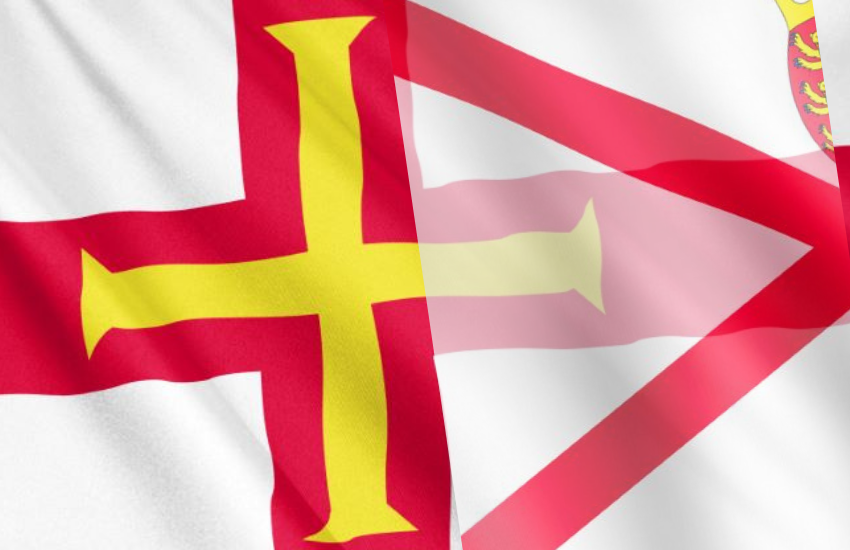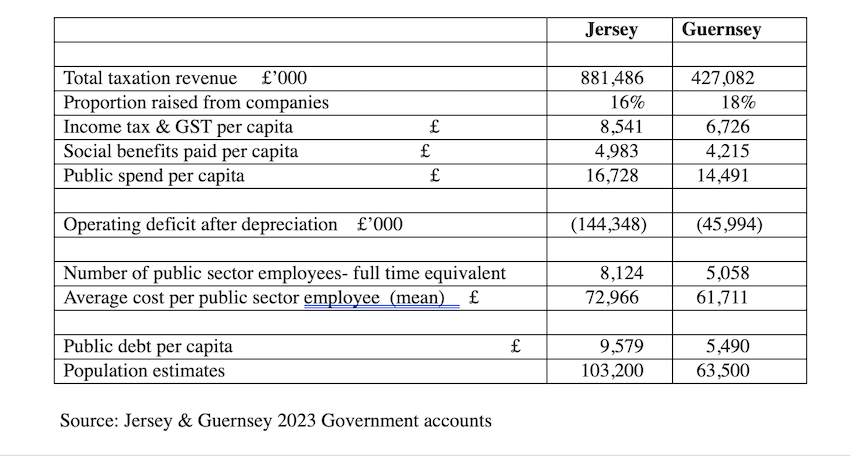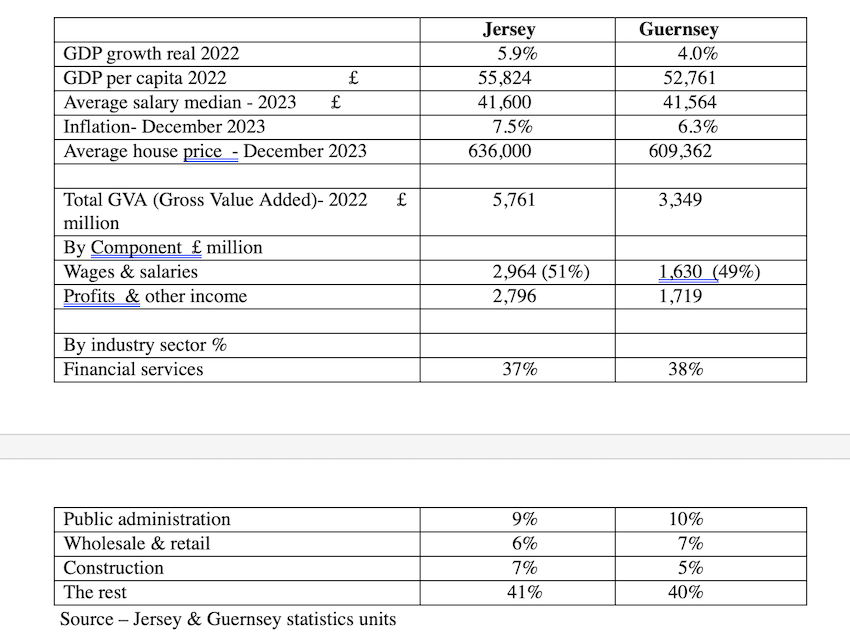


It is time to look again at the opportunities for Guernsey and Jersey to work more closely together for the benefit of both communities, business leader Kevin Keen has argued.
In an article that first appeared in the Jersey Evening Post, Mr Keen compares the two island's finances and economies as he set out the case for change:
Over the years, I have worked with a lot of Guernsey-based businesses and have visited the island many times.
It is amazing how islands that are so close can be so different, but they are. Unfortunately, quite a few of us in Jersey like to look down on Guernsey and sometimes Guernsey people can even find themselves looking up to their flashier, richer neighbor.
The reality is that the islands are different, but both are beautiful and have their own advantages. They also have a number of problems that are common.
Both are tiny,so lack scale. They have a tax system that relies on people working and consuming, but have an ageing demographic, which implies shrinking populations.
Soit’s clear to me that there would be many advantages if the islands could find more ways to work together. Not doing things the Jersey way or the Guernsey way, but a new Channel Islands way that respected each island’s community, independence, history and needs.
With the recent publication of 2023 government accounts, I thought it might be interesting to attempt another bean-counters comparison.
A warning, before I get into trouble with the politicians – there are different public sector structures in each island and some differences in accounting policies, but I think the comparisons are still worth looking at, at the very least to stimulate thought and debate.
In the table below, I have calculated a few basic numbers, which I hope readers will find useful when considering our public finances. I appreciate most will find this rather boring, but there is one that I don’t think is boring though, and that is if Jersey had the same public sector costs per head of population (£14,491 vs. £16,728) Jersey would save over £230 million per year.
As an example, with £230 million savings it would allow us to more or less double the budget of Education andthe police, which between them spent £233 million in Jersey in 2023.
The current deficit of funding for Health of £24 million would be easily solved.Makes you think, doesn’t it? Although it is clear both islands suffer from a lack of scale economically, Jersey being bigger should really be cheaper to run per citizen than Guernsey, not the other way round.
The only explanation I can come up for this disparity is that Jersey has always been a bit richer, so was able to spend more, and this wealth has worked its way into every cost – and sadly will be very difficult to change.

The first thing to note from the above table is that in Jersey we pay a bit more tax than in Guernsey, on average £8,541 per head compared to Guernsey’s £6,726, part of the reason for that is clearly GST, which currently does not exist in Guernsey. That accounts for about £1,100 of the difference per person.
On the expenditure side, the average public servant in Jersey cost £72,966 in 2023, his or her Guernsey counterpart £61,711.
As to the difference in numbers, over 8,000 full time equivalent employees work in Jersey versus 5,000 in Guernsey. It’s understandable that at the front line we need more nurses, doctors, teachers etc, after all we have a bigger population.
That logic does not follow for many management and back-room functions though, where the economies of scale should come in.
Why public servants cost more in Jersey than Guernsey is a bit harder to understand because, as you will see from the table that follows, the average salary for all employees in each island is about the same, just under £42,000 per year.
Again, before I get in trouble with any current politicians, I should make it clear these differences in cost and approach will have occurred over many years and are not the fault of current ministers. That said the difference in cost does represent an opportunity to learn from our sister island and hopefully save some money, especially as both islands ran quite large operating deficits (spent more than they brought in!) during 2023, so there is plenty of motivation to save money.
Public debt levels between the two islands are quite different; Guernsey has debts of some £348 million (about £5,500) per islander, while Jersey leads with total debt of almost £1 billion or £9,600 per resident.
This comparison is a little unfair because Jersey still has a substantial strategic reserve (although way smaller than it should be according to the Fiscal Policy Panel) of £1 billion. It could be argued that, on a net basis, Jersey is debt free whilst Guernsey has debts of £348 million.
That does not make me feel any better, but if Jersey does want to play the “we’re richer than you” card,I suppose it’s a point.
Jersey’s economy grew by 5.9% to £5.7 billion in 2022,wholly due to higher interest rates feeding into bank profits, compared toa 4% increase to £3.3 billion in Guernsey. The GDP (gross domestic product)per capita was about 6% higher in Jersey than Guernsey.
As already noted, and as we can see from the table below, average earnings from employment are almost identical and house prices on average are just a little cheaper in Guernsey.

If you have read any of my previous essays, you will know that I think that GVA statistics need to be treated with extreme caution. To quote the late Robert Kennedy (again!): “It counts napalm and counts nuclear warheads and armored cars for the police to fight the riots in our cities.”
“Yet the gross national product does not allow for the health of our children, the quality of their education or the joy of their play.”
He adds: “It measures neither our wit nor our courage, neither our wisdom nor our learning, neither our compassion nor our devotion to our country, it measures everything in short, except that which makes life worthwhile.”
Wise words, but of course our economic performance is crucially important. As Mr Kennedywarned,we do need to be careful, for example in Jersey our government often uses GVA for resource-allocation decisions. There is even an app for us to work out our own personal GVA.
As can also be seen from the table above, both islands depend on corporate profits for about half their GVA, but in Jersey’s case only 16% of tax revenues come from corporate profits. Guernsey does a little better at 18%.
This is all due to the zero-ten tax regime, which is judged by both islands to be essential for their financial services industries. That system will continue to present challenges as we try to manage the population.
It was not long ago that politicians in Jersey seemed anxious to close our doors to new people coming here to please voters, but now many are realising that due to the ageing demographic we may need to encourage immigration just to be able to fund public services. It won’t be a popular move, butwill almost certainly benecessary in the future.
The rivalry between the two the two islands apparently goes back to the English Civil War in the 1600s, when Jersey backed the King and Guernsey the parliamentarians. Since then the rivalry has been more friendly and probably centeredon football and competition between each island’s finance industry.
From what I can see (as someone who does not work in that industry) that rivalry is almost certainly also outdated, because most firms that operate in the finance industry are now global (often with operations in Jersey and Guernsey) and will make their choice based on where it is best to do business.
It may suit them to play each island off against each other from time to time,but I really wonder if it gets either island very far.
Jersey and Guernsey never competed in agriculture, they were better at tomatoesand we had the Jersey Royal (…and our cows are prettier – but that is just a Jerseyman’s view!), but both breeds are great and produce fantastic milk and cream.
When it comes to tourism, there maybe some competition, but I am sure the offer could be better if we were able to market the Channel Islands as the stunningisland hopping destination it could be.
I think most would agree bothislands’public finances are not what they were and, as I have said,both islands suffer from being sub-scale, which can mean services are economically inefficient and therefore more expensive.
Both islands currently need improvements to their hospitals. Guernsey residents were shocked to learn recently that their hospital-improvement costs had doubled to £154m from initial estimates of around half that. I have lost touch with how much our new hospital might cost, but I think Jersey hasprobably spent at least £100 million deciding what to do, but not doing it.
Some progress is finally being made in Jersey, but it’s clearly going to cost a lot more than Guernsey could ever even contemplate.
To be fair, there are examples of some co-operation between the two islands, but if only there could be more. Regulatory bodies would seem to be a perfect opportunity, which would reinforce their independence, but I am sure many other functions could benefit both on cost grounds and efficiency.
One of the barriers to greater co-operation is clearly history and each island’s closely guarded independence, but more important these days is probably being able to move people and things quickly and cheaply.
Some readers may know that I am in favour of a careful investigation of the pros and cons of a physical link to France, and I believe it would also make sense if we could connect with Guernsey at the same time.
We know from the examples in the Faroe Islands with 18 separate islands and fewer people living on them than Guernsey,joining islands is possible and seemingly an economic proposition.
With two comparatively new Chief Ministers, both of whom have plenty of political and business experience, and a new government chief executive in Jersey, now surely must be the time to look afresh at the opportunities for both islands to work together more closely for the benefit of both communities.
There are too many common challenges to let history and ego get in the way.